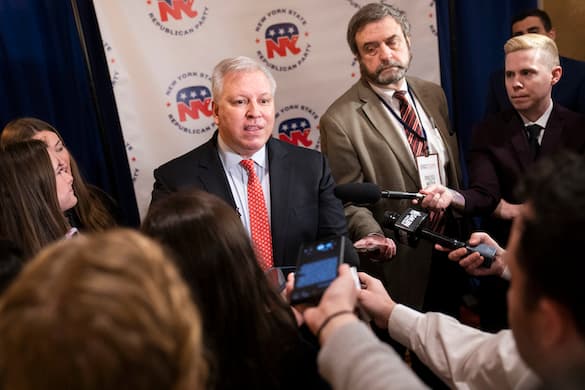Governor Wilson, or Zeldin, Could Put New York Back on Republican Map
Wilson may have an easier time than Zeldin at winning over anti-Trump independent and Democrat crossover voters in a general election, though some influential New York Republican donors are coalescing around Zeldin.

Republican voters in New York will choose a candidate for governor in a primary scheduled for June 28, 2022. The outcome could shape the party’s future well beyond the borders of the Empire State.
It’s a crowded field, in part because the incumbent, Democrat Kathy Hochul, seems vulnerable. Democrats nationwide face the drag of President Biden’s unpopularity amid stagflation. Ms. Hochul had been lieutenant governor and wound up in charge of the state by default after Andrew Cuomo resigned in a sexual harassment scandal. Ms. Hochul faces her own contested primary for the Democratic nomination.
The Republicans in the governor’s race include a congressman from Long Island, Lee Zeldin; a former Westchester County executive, Rob Astorino; a son of Mayor Giuliani, Andrew Giuliani; and a businessman and turnaround expert, Harry Wilson.
Mr. Wilson is someone I’ve known for 30 years and ran into over this past weekend. He’s a strong, principled, pro-growth, lifelong conservative in the cheerful pattern of Ronald Reagan or Jack Kemp. The Zeldin camp has been trying, absurdly, to cast doubt on his Republican bona fides. It’s nonsense.
Browse federal campaign finance records and you’ll see contributions from Mr. Wilson to Mitt Romney’s 2012 presidential campaign, to the Republican National Committee, to the campaigns of New York Republicans such as John Faso, Elise Stefanik, and even, in 2014, to Mr. Zeldin’s congressional campaign. Mr. Wilson was president of his college Republican Club, and of a campus student group created to support Operation Desert Storm, in the early 1990s, when he was working his way through school scrubbing toilets.
When I interviewed him back in 2010, he was a New York Republican candidate for state comptroller. He warned then, accurately, that the state’s high tax burdens were driving out businesses and talent. The departures only accelerated with the decline of New York City under Mayor de Blasio, with the rise of remote work during the pandemic, and with the recent emergence of Florida as a serious cultural and financial rival.
In the New York race, as in other Republican races nationwide, President Trump’s influence looms large. Mr. Wilson has said he voted for Mr. Trump in 2016 but in 2020 wrote in the name of Nikki Haley, the former governor of South Carolina who was ambassador at the United Nations. Mr. Zeldin, a lieutenant colonel in the Army Reserve who served in Iraq in 2006, voted in Congress to reject the 2020 election results reported by Arizona and Pennsylvania.
Mr. Trump is popular with the Republican primary electorate, but he lost New York to Mr. Biden in 2020 by about 2 million votes of about 8.5 million cast. Mr. Wilson may have an easier time than Mr. Zeldin at winning over anti-Trump independent and Democrat crossover voters in a general election, though some influential New York Republican donors are coalescing around Mr. Zeldin.
Messrs. Astorino, Zeldin, Wilson, and Giuliani are expected to clash in a June 13 televised debate. The primary might possibly even be delayed until August as a consequence of a legal battle over New York’s congressional district and state Senate lines.
If Mr. Wilson does make it to the governor’s mansion and deliver on his agenda of turning the state around by cutting taxes, reducing crime, and imposing term limits on Albany politicians, then watch out. A Republican governor of New York, Nelson Rockefeller, was vice president of the United States. A Republican governor of New York, Thomas Dewey, was the GOP presidential nominee in 1944 and 1948. A Republican governor of New York, Teddy Roosevelt, was president of the United States. Even Mr. Trump was elected as a New Yorker, though he has since, like a lot of other prominent and wealthy former New Yorkers, moved to Florida.
A Governor Wilson, or perhaps even a Governor Zeldin, could, if successful, eventually return New York to national relevance in a Republican Party increasingly dominated by the Southerners like Ms. Haley and her fellow Palmetto State politician Senator, Tim Scott, Governor DeSantis of Florida, and a Sunshine State senator, Rick Scott.
Outsiders look at New York and see the progressives who helped to elect Mr. de Blasio as mayor. It was 20 years ago, in 2002, when a Republican, George Pataki, won a third term as governor in the aftermath of the September 11, 2001, terrorist attacks. Whether there are enough potentially Republican-supporting voters remaining to muster a comeback — or whether they have, like Mr. Trump, mostly decamped elsewhere — will help determine the party’s future tone not only in the Empire State but nationwide.

